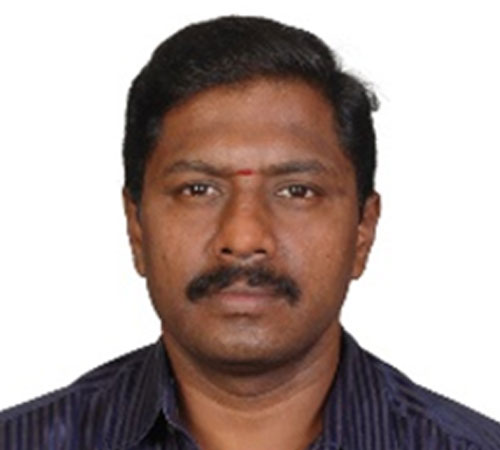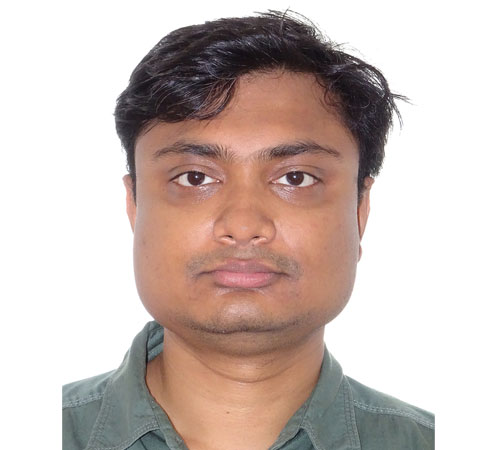Meet our awardees
We are delighted to announce the latest recipients of the Transforming Systems through Partnership (TSP) grant awards from India and UK. These projects, focused on green energy and affordable healthcare, are set to run until January 2025. This scheme is conducted in partnership with India’s Department of Science and Technology.
Low cost li-free battery-supercapacitor hybrid Technologies for energising rural communities
Professor Narayanan Tharangattu Narayananata, Tata Institute of Fundamental Research Hyderabad
UK Project leads:
- Dr Aruna Ivaturi, University of Strathclyde
- Dr Buddha Deka Boruah, University College London
Industry partner: Kalinga Renewable Energy Manufactures (KARMA) Pvt Ltd. India
This project aims to bring clean water and lighting to rural areas by developing cost-effective battery-supercapacitor systems using advanced zinc-based batteries and activated carbon composites. The goal is to develop high-performance zinc-air and zinc-ion batteries, which have several benefits over conventional lithium-ion batteries, including cheaper costs and increased energy density. These batteries can be used as backup energy for renewable energy sources like solar and wind power, as well as stationary mini-grid and off-grid energy storage systems. The SMaRDT group at the University of Strathclyde, in collaboration with Indian industrial partners, will integrate these technologies to offer cost-effective and efficient rural electrification solutions.

Green hydrogen synthesis from agro residues for sustainable transportation
Dr Karthikeyan Palaniswamy, PSG College of Technology
UK Project lead:
- Dr Senthilarasu Sundaram, Edinburgh Napier University
Industry partner: Electric Vehicle Research & Development, CREAT Uno Minda
Other partners:
- Tamil Nadu Agricultural University, Renewable Cogen Globe – Energy, Coimbatore
- Environment & Climate Change, SS Renewable Cogen Private Limited, PSG College of Technology, Coimbatore

This project demonstrate green hydrogen utilisation and synthesis technologies. Specifically, it tests internal combustion engines that run on hydrogen to determine the ideal air-fuel mixture and injection timing. To achieve net zero carbon transportation, hydrogen produced via agro-based technologies will be tested in PEM Fuel Cell Systems. The project's objective is then to evaluate these systems' performance, durability, and degradation while maintaining consistent spatial temperature distribution. With a significant impact on the neighbourhood, this project provides useful information for the Indian industry to create consumer-ready goods, which helps India become more independent and integrated into international supply chains. The partnership and workshops with the UK will facilitate further knowledge dissemination and collaboration opportunities.
Development of new electrode materials for the next-generation batteries with improved energy and power density
Dr Kanwar Nalwa, Indian Institute of Technology Kanpur
UK Project leads:
- Dr Simon Lambert, Newcastle University
Industry Partner: Cancrie Pvt Ltd
This project is dedicated to revolutionising battery technology through the development of low-cost and sustainable electrode materials for the next generation of batteries. The focus includes creating novel carbon materials from sustainable bio-based sources for lithium-ion batteries (LIBs) to achieve heightened energy power storage capabilities. The project involves fabricating LIBs with specific cathode and conductive materials, optimising their performance through comprehensive testing and validation processes for both high-power and high-energy applications. Additionally, the project explores advanced manufacturing techniques to enhance production processes, aiming to lower battery costs, improve accessibility, and facilitate upscaling of battery production in the Indian market.

Critical Care Digital Twin - pathway towards affordable healthcare
Dr Vibhor Pandhare, Indian Institute of Technology Indore
UK Project lead:
- Dr Ajith Parlikad, University of Cambridge
Industry partner: Presage Insights Pvt. Ltd.
Other partner:
- All India Institute of Medical Sciences, IITI DRISHTI CPS Foundation
The project focuses on improving critical care accessibility by addressing challenges such as limited availability, high costs, and the complexity of managing diverse data in healthcare settings.

The initiative aims to enhance patient outcome by incorporating a digital twin- based Clinical Decision Support System (DT-CDSS) into critical care facilities. This system will utilise communication protocols, simulation models, analytics and visualisation through a user-friendly dashboard to simplify decision-making for medical practitioners.Additionally, the project includes training healthcare professionals and researchers on the overall growth and sustainability of the transformed healthcare system. They key outcomes of the project include better understanding of critical care system data, the implementation of DT-CDSS, and the development of an introductory course on digital twin technology.
AI-driven adaptive fast charging for electrical vehicles- empowering skills and curriculum development
Dr Chitra A, Vellore Institute of Technology
UK Project lead:
- Dr Maher Al-Greer, Teesside University
Industry partner: Priva Technologies, Pvt. Ltd
Other partner:
- eApta Dynamics Pvt. Ltd. , Warar Energy
This project involves the creation of an innovative Electric Vehicle charger with AI capabilities, aimed at accelerating charging speeds and improving user convenience. This development is anticipated to significantly contribute to the adoption of cleaner transportation options, playing a crucial role in promoting sustainability.

Additionally, the initiative includes the establishment of a comprehensive educational framework focused on EV battery charging. By empowering individuals with the necessary skills for the evolving EV sector, the project aims to cultivate a skilled workforce and support the growth of a clean energy economy. The collaboration between academic and industry experts is expected to result in a cutting-edge smart charger, ultimately contributing to a more sustainable and environmentally responsible transportation ecosystem.
Advancing green hydrogen production through electrolysis: optimisation and renewable energy integration
Dr Vishal Kumar Sandhwar, Institute of Technology
UK Project lead:
- Professor Satheesh Krishnamurthy, University of Surrey
Industry partner: Linde Engineering India
The project’s primary objective is to design and develop a smart electrolyser powered by solar energy, incorporating intelligent features for monitoring and control. This innovation addresses challenges such as reducing production costs, improving efficiency through alternative electrode materials, and establishing a robust infrastructure for storage, transportation, and utilisation of green hydrogen. It aims to play a crucial role in advancing sustainable, low-carbon pathways for a cleaner energy future.
Green hydrogen is highlighted as a key solution, offering the potential to replace fossil fuels and contribute to mitigating climate change.

Development of decarbonised GT combustion technologies using green hydrogen and biogas (DESTINY)
Dr Sudipto Mukhopadhyay, Indian Institute of Technology Jodhpur
UK Project leads:
- Dr Midhat Talibi and Professor Ramanarayanan Balachandran, University College London
Industry partner: Innovation, TurboTech Precision Engineering Pvt. Ltd.
The project aims to investigate modifications needed for existing MGT combustors designed for natural gas, for successful operation using HHO-biogas blend, through numerical and experimental techniques. The learnings from this project will be shared with industry and academia through social media, workshops, and publications. The project’s scientific outcomes have the potential to feed into the development of the next generation of zero carbon emission MGTs.

Vortex energy drive for eco-friendly and sustainable energy harvesting
Dr Swapnadip De Chowdhury, Indian Institute of Technology Kharagpur
UK Project lead:
- Dr Zaibin Lin, University of Aberdeen
Industry partner: Honeyloop Technologies Private Limited
Other partner:
- Virya Paramita Energy Pvt Ltd
The Vortex energy drive is a novel hydro-kinetic energy harvesting technology with minimalistic human foot-print on environment being developed by Honeyloop Technologies, a start up company which aims to commercialise the technology. This project involves laboratory testing and testing of a prototype in real-time conditions to understand the range of scalability of the technology. Based on the outcome of the testing, design modification would be proposed to mathematical analysis.

Feasibility study of liquid-Ammonia direct injection stratifications: Towards carbon-free combustion
Professor Sudarshan Kumar, Indian Institute of Technology Bombay
UK Project lead:
- Dr Angad Panesar, University of Brighton
Industry partner: Hindustan Petroleum Corporation Limited (HPCL), Weslake Engine Design and Manufacture (UK)
The project provides a practical insight into the feasibility of liquid-NH3/H2 stratification as sustainable fuel options for next-generation engines, aiding in the development of cleaner and more efficient transportation solutions. Through performing a detailed energy-exergy analyses to quantify the efficiency gains and environmental impact of utilising these blends in split-cycle and reactivity-controlled combustion engines.

Improving sustainability of present-day manure based biogas digesters through biochar addition
Dr Balanchandran Srinivasan, Visva-Bharati
UK Project lead:
- Professor Manosh Paul, James Watts School of Engineering, University of Glasgow
- Dr Arjunan Subramanian, Adam Smith Business school, University of Glasgow
Industry partners:
- Suiso
- Defiant Renewables, India
The project aims to enhance manure-based anaerobic digester efficiency by adding biochar, which is known for its adsorption capacity. It can improve methane production and address operational challenges like low productivity and ammonia inhibition. This project explores biochar application in Indian AD systems, aiming to promote its practical use in domestic digesters in West Bengal and Maharashtra. The study also integrates microwave technology into Indian digester designs to optimise heating efficiency and flow patterns, aligning with sustainable development goals.

